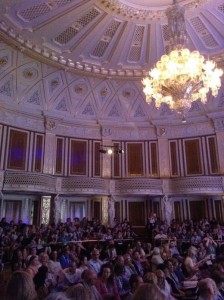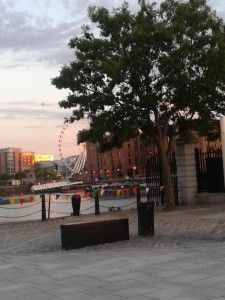In July 2015, I was fortunate enough to have had the chance to have 2 new experiences, the first day of the new CILIP Leadership Programme and the opportunity to attend the CILIP Conference 2015, both in Liverpool (and I also met some great new people).
CILIP Leadership Programme
The CILIP Leadership programme is a pilot initiative which is aimed at librarians with some leadership experience or who are mid-career professionals. It offers the opportunity to meet other colleagues from various sectors and from different parts of the country. It also includes 4 workshops, some online activities and discussions via the CILIP VLE, the chance to develop a personal development plan based on the CILIP skills framework (PKSB) and to work on a project for the CILIP Member Networks. At the event, we had a speed networking event to introduce ourselves and then some general discussion on leadership styles and talks on peoples’ leadership journeys. Advice included: “Be who you are, follow your passion, stay grounded & never forget your roots”.
In the afternoon, we were in our project groups. I am working with other colleagues on a CPD project for some of the member networks. I think one of the challenges will be to clarify and define the project scope and find suitable methods of communication at a distance and allocate roles to people on the project team. I look forward to having some new insights and learning opportunities. It was great to meet some new and very friendly colleagues, some of whom also attended the CILIP Conference.
CILIP Conference 2015 http://cilipconference2015.org.uk/
After the Leadership workshop, there was also the opportunity to attend the CILIP Conference at the rather amazing St George’s Hall in Liverpool. The strapline for the conference was: Connect Debate Innovate. It was much larger than I expected, there were 600 delegates from different sectors and 50 speakers/ presenters. The conference was very professional and started really well in the impressive auditorium.
Keynote speakers
One of the major strengths of the conference was the keynote speakers. Shami Chakrabarti was a really engaging and dignified speaker. She has been Director of Liberty since September 2003. Her background is as a barrister and she has been involved with the defence and promotion of human rights. She spoke of Doreen Lawrence’s passionate struggle for justice and the personal consequences of this. Her first book, On Liberty was published in October 2014. Her keynote spoke of threats to democracy and human rights, she is a passionate advocate of libraries as civic and creative spaces and some of her messages were: “Ultimately every human life is precious, simply because it’s a life.” and “Privacy, conscience and free speech are not absolute”.
Another very passionate and compelling speaker was the Guardian journalist and blogger, Erwin James www.erwinjames.co.uk/biog.html . He began a 20 year prison sentence for a serious crime in 1984.” Twenty years later he was released and is now an arts graduate and award winning writer. He is a Guardian columnist and full-time freelance writer and blogger. He was transformed by reading and education, He read books in the prison library and was changed by reading a book sent to him by a friend of his called “Prisoners of honor the Dreyfus affair” by David Lewis. (Dreyfus was wrongly accused of a crime and imprisoned but later exonerated and is a famous figure in French history). His keynote was very honest and very moving and compelling. Some of his messages were: “We are all born with hope” and “Find the freedom to be who you are.”
Workshops
These were on four main themes:
- Information management
- Information literacy and digital inclusion
- Demonstrating value
- Digital futures and technology
The workshop speakers and some with links to their presentations are here: http://cilipconference2015.org.uk/session-speakers-2/ ( I think this is a good way of displaying speakers’ presentations) Some of the workshops I attended are:
Charles Inskip, UCL – Digital Literacy in the work place.
This talk provided an overview of thinking and practice in workplace information literacy, an important developing area. It considered the semantic gap between education and workplace settings and identified key issues around graduate skills and the challenges to library and information professionals in bridging that gap. The speaker’s Research information literacy blog is here: https://rilads.wordpress.com/
Hannah Gore, Open University – Badging digital literacy
Blog post http://www.open.ac.uk/blogs/OpenMedia/?p=1279 OU Free courses http://www.open.edu/openlearn/about-openlearn/try#Badged%20open%20courses
Badged Open Courses (BOCs) are free courses from The Open University, including English for study, Succeed in the Workplace, First Steps into HE and Digital Literacy. The Open University BOCs are different to MOOCs in that they are aimed at a widening participation audience. They are delivered via The Open University’s OpenLearn platform for free and provide recognition in the form of electronic badges and statements of participation that learners can display, export to application letters and CVs, and share on other third party social platforms. The Digital Literacy BOC in particular aims to help learners develop the skills for effective online learning. These skills include searching efficiently, critically evaluating information, communicating and sharing online, and selecting the right online tool. The completion rate is higher than MOOCs (9% instead of 5%).
Vanessa Hill and Adam Edwards, Middlesex University – Quality and impact of library workshops http://find.jorum.ac.uk/resources/10949/18121
Information literacy delivery is always a challenge in terms of timing, content and delivery and embedding. At Middlesex, games are used to introduce a social and peer learning dimension and encourage group learning. They have found the approach successful, some resources can be found on Jorum (above). There was a chance to play one of the games in the workshop, where various coloured cards had to be matched up for different resources eg, book, journal articles, website, trade journal etc. It seemed to produce discussion and engagement in the room. It may not suit all learning styles and may not be suitable for all levels eg. academic staff and experienced researchers or all subjects (eg Law).
Conclusion
It was great to meet the CILIP Leadership participants and go for a meal and a walk by the Albert Docks on the first night to get to know some of them. I’m also very grateful to our Library Leadership Team for the opportunity to participate in the CILIP Leadership Programme and to attend the CILIP Conference . I was impressed by the great St George’s Hall, the professionalism of the conference, the engaging keynotes and some of the workshops were useful.
![CI0-j-BWgAA_vkl[1]](https://blogs.city.ac.uk/developingatcity/files/2015/07/CI0-j-BWgAA_vkl1-138vck2-300x114.jpg)


